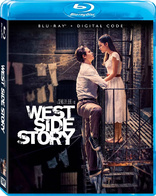West Side Story Blu-ray Movie
HomeWest Side Story Blu-ray Movie 
Blu-ray + Digital CopyDisney / Buena Vista | 2021 | 156 min | Rated PG-13 | Mar 15, 2022
Movie rating
7.6 | / 10 |
Blu-ray rating
| Users | 5.0 | |
| Reviewer | 4.0 | |
| Overall | 4.0 |
Overview
West Side Story (2021)
An adaptation of the 1957 musical, West Side Story explores forbidden love, and the rivalry between the Jets and the Sharks, two teenage street gangs of different ethnic backgrounds.
Starring: Ansel Elgort, Rachel Zegler, Ariana DeBose, David Alvarez, Rita MorenoDirector: Steven Spielberg
| Musical | 100% |
| Music | 45% |
| Drama | Insignificant |
| Crime | Insignificant |
Specifications
Video
Video codec: MPEG-4 AVC
Video resolution: 1080p
Aspect ratio: 2.39:1
Original aspect ratio: 2.39:1
Audio
English: DTS-HD Master Audio 7.1 (48kHz, 24-bit)
Spanish: Dolby Digital 5.1 (640 kbps)
French: Dolby Digital 5.1 (640 kbps)
Subtitles
English SDH, French, Spanish
Discs
Blu-ray Disc
Single disc (1 BD)
Digital copy
Playback
Region A (B, C untested)
Review
Rating summary
| Movie | 4.0 | |
| Video | 5.0 | |
| Audio | 5.0 | |
| Extras | 2.5 | |
| Overall | 4.0 |
West Side Story Blu-ray Movie Review
Reviewed by Jeffrey Kauffman March 10, 2022One of the things that has been discussed, sometimes rabidly, in the wake of this remake of the venerable 1961 film version of West Side Story is, "Should there have even been a remake?" After all, would anyone ever attempt to remake Citizen Kane? (And please don't tell me if anyone is planning to.) But there's a salient difference at hand with regard to West Side Story, at least contextually, and that's the fact that it was, not to state the obvious, originally conceived as a theater piece, and any theater company that has ever produced the show in the decades since its Broadway premiere in 1957 has in their own way "remade" it. Now, the vagaries of licensing a musical for stage performance typically mean that not too many liberties can be taken, but even so, with a "living" entity like a stage production, there's an almost "built in" at least perception of new if not always improved iterations in the mix, despite the fact that by the very nature of the medium, any film adaptation is "set", to use a blocking term of art from the theater. That said, it was an undeniably audacious thing for Steven Spielberg to even suggest that he would do an updated film version of one of the most beloved film musicals (and, indeed, films) of all time, one which famously broke box office records and won one of the highest number of Academy Awards ever doled out (ten, including an honorary statuette bestowed upon choreographer Jerome Robbins), and a film which is still held in incredibly high esteem for both its artistic merit and its visceral emotional impact. And yet perhaps unsurprisingly there have been naysayers with regard to the Robert Wise classic, especially in more "PC" times looking back to the casting of various characters who were supposed to be Puerto Rican but who, at least in the form of Natalie Wood, most decidedly weren't. (While George Chakiris was also not Puerto Rican, he at least had some history with the stage version, having portrayed Riff on the West End for almost two years.) Other curmudgeons have also lamented the fact that the two leads in the 1961 version did not do their own singing (Jimmy Bryant sang for Richard Beymer and the legendary Marni Nixon subbed for Natalie Wood). Those issues have been addressed at least in some fashion in this remake, and scenarist Tony Kushner and director Steven Spielberg have also added a number of other tweaks which may or may not find favor with those familiar with the original stage version and the 1961 film.
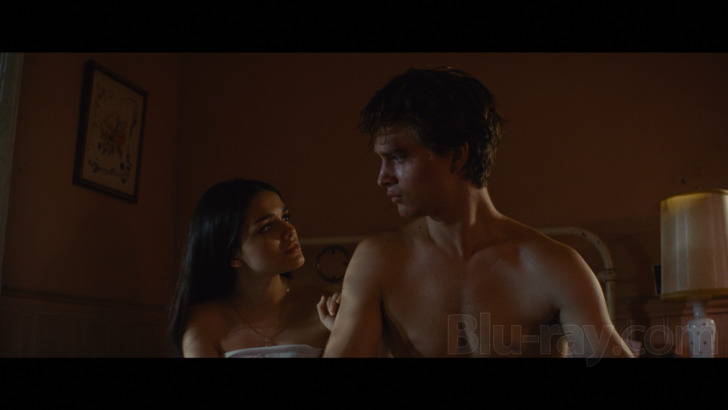
Note: If anyone needs a recap of the plot dynamics of West Side Story by this point, I'd suggest starting with a little play some may have heard of called Romeo and Juliet. For my thoughts on the first film version of West Side Story, you can consult my now long ago West Side Story Blu-ray review of the first Blu-ray release of the 1961 version.
One of the inherent hurdles Spielberg and his team had for this remake is that it is simply inarguable what a stylistic jolt the Wise - Robbins effort was for a film that came out in 1961, as I discuss in some detail in the above linked review. Until then, film musicals had often become increasingly stodgy, and when considering the 1961 film, even aside and apart from Robbins' spectacularly athletic ballet sequences, elements like the overhead shots of Manhattan or the brilliant segue into the dance sequence (interestingly just one of several uses of filters that would seem to belie the typically disparaged use of them in the then relatively recent film version of South Pacific) prove what an incredible achievement the "first" West Side Story was on purely visual merits alone. And so, in a way, this effort would seem to be very much like someone announcing a remake of Citizen Kane, simply in terms of having to banish memories of an indelible visual style.
Both the stylistic and casting aspects provide interesting entrance points to this version, at least from a certain "meta" standpoint. It's been highly publicized, to say the least, that this version offers ostensibly more "accurate" casting with regard to some of the Puerto Rican characters. That includes Rachel Zegler as Maria, Ariana DeBose as Anita (Academy Award nominated for this performance), and David Alvarez as Bernardo. However, it should also be noted that even these apparent steps toward "appropriateness" (if that's even the right term) have been questioned by some, with intense discussions about just how Puerto Rican some of the performers are, as if some kind of DNA test were required, though of course years of under representation or outright misrepresentation has to be factored into how various people have responded. This controversy brings to mind a kind of hilarious (to me, anyway) quote by a professional actor friend of mine reacting to what some might term woke attempts to cancel portrayals by performers not deemed to be of the "type" being portrayed, "Actors need to promise to never pretend to be something they're not." Putting aside whatever qualifiers this approach almost automatically engenders, I found there to be an undeniable sweetness to Zegler's portrayal, and some remarkable ferocity in the work of both DeBose in particular and Alvarez. On the decidedly Caucasian front, Mike Faist makes for a compelling Riff, with a kind of snarkiness that is reminiscent of but still different from Russ Tamblyn's approach.
As I mention in my review of the 1961 version, Richard Beymer's Tony often bore the brunt of negative critical assessment at the time, and while I'm not sure Ansel Elgort brings any more perceived "authenticity" to his portrayal (especially since Tony is now an ex-con in this version), he is a likable and accessible presence in the film. Rita Moreno, who of course won one of the first film version's many Academy Awards for her portrayal of Anita, is famously on hand here again in this film's version of the store owner who employs Tony, in this case Pop's Puerto Rican widow Valentina. One of the more noticeable changes from the original which won't be spoiled here (but which is already pretty generally known) was obviously designed to give Moreno her own solo singing moment, and while it's touching if probably unavoidably self reflexive, I'm not sure it was really needed, especially since the emotional brunt of the moment seems more overtly generalized now rather than having the specificity it did in the stage and first film versions, a specificity about two characters that nonetheless suggested a more general yearning without hitting the audience over the head with it.
Stylistically, Spielberg offers his own take on things, and they're often impressive, but I have to say for me personally, as someone who was literally dragged to repeated viewings of the original West Side Story by my elder sisters when I was a kid, they most decidedly did not banish memories of the original. The mere fact that Spielberg even considered doing this, though, unabashedly impresses me and his reimaginings of now iconic moments in the original are often masterful and almost always visually interesting (although I had to wonder what was up with what I'm assuming were artificial lens flares scattered ubiquitously throughout the film but especially noticeable during the dance at the gym sequence). All of this said, for anyone who loves the 1961 West Side Story, comparisons kind of inevitably will come into play.
Tony Kushner's additions, subtractions and revisions to the original are a mixed bag, in my estimation. He probably wisely develops the character of Chino (Josh Andrés Rivera), Maria's would be suitor, which probably gives the tragic finale a bit more subtext, especially in terms of an underlying element suggesting basically "good boys" can give in to violence. The introduction of Valentina, a Puerto Rican who had married a "gringo" (in her words), obviously gives Moreno a great showcase for her inimitable presence (she also executive produced), and I think is actually a kind of smart revision, though I have to say I wasn't buying any of either Moreno's or Elgort's "ain't"s and inappropriate "don't"s (with second person singular subjects, for example). And in fact some of the expository dialogue in this version I found to be positively clunky at times.
That "should" in my opening sentence above is a perhaps provocative qualifier itself, since who's to say who should or shouldn't attempt a new version of something? I will say as someone who was exposed to West Side Story at a very young age and who is reasonably well acquainted with the score, I found this version to be beautifully sung and powerfully danced. I had variable reactions to some of the rejiggered orchestrations, and I frankly wanted Leonard Bernstein's incredible music to be mixed further up in some moments where sound effects can take precedence, as in the lengthy opening sequence. For me personally, this version won't replace the Wise version, but in my estimation it also stands on its own as a formidable achievement, even if per now long established West Side Story tradition, some may take issue with various aspects. The fact that anyone is talking about film musicals in 2022 for any reason I consider to be a good thing, and I frankly also consider this version of West Side Story to be a generally good thing as well.
West Side Story Blu-ray Movie, Video Quality 
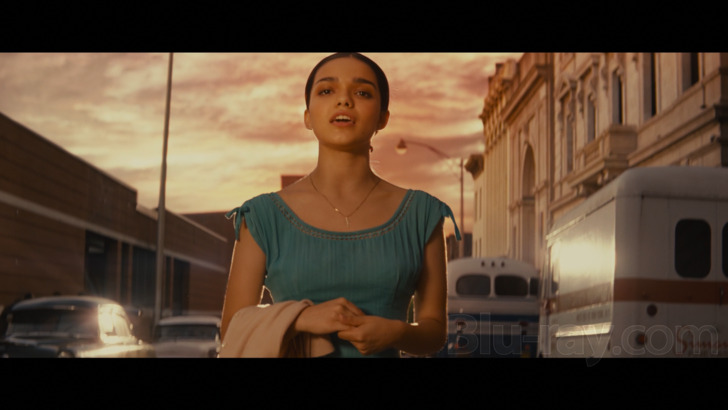
West Side Story is presented on Blu-ray courtesy of 20th Century Studios and Disney / Buena Vista with an AVC encoded 1080p transfer in 2.39:1. Shot on Kodak 35mm film (the closing credits actually list the lots of negative stock, something I don't think I've ever seen before), and with the IMDb reporting a 4K DI, this is a really spectacular looking presentation from both detail and palette standpoints. The film is a lot more overtly graded at times than the 1961 version, but there's a rather refreshing gamut of tones employed, with some buttery outdoor material contrast with much cooler, blue tinged, interior pieces. The costumes are a revelation from both fine detail and color perspectives, and though he has some stiff competition, I won't be surprised if Paul Tazewell brings home an Oscar for his efforts. Fine detail on patterns on both the costumes and other practical items like the bricks on surfaces (when they're not CGI, which I'm assuming they are at least some of the time) is also precise looking. As mentioned above in the main body of the review, there is a surplus of lens flares throughout the film, which to my eyes did not look especially organic and which ultimately tended to distract me at times. Grain resolves beautifully throughout the presentation.
West Side Story Blu-ray Movie, Audio Quality 
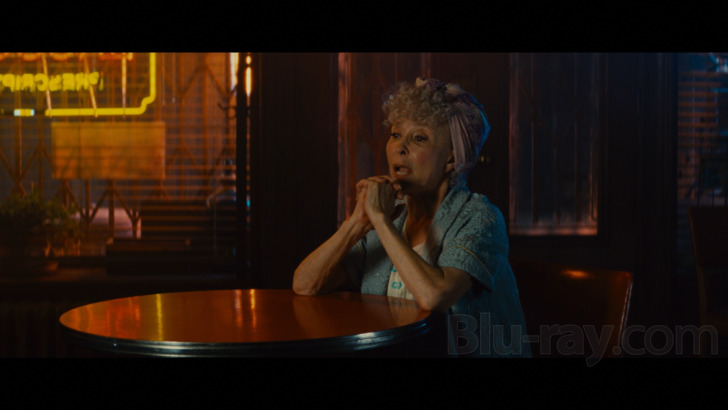
West Side Story features an impressively designed DTS-HD Master Audio 7.1 track which makes full use of all channels from the get go, with a really wonderfully immersive opening which features discrete channelization of the "whistle" effects and then the clamor of construction noise slowly creeping through the side and rear channels. All of the outdoor material throughout the film bristles with really well done ambient environmental effects. As I mention above in the main body of the review, I had some passing qualms with the mix, when Bernstein's music is obviously dialed down a bit for a passing sound effect (or several), but the track supports the often elaborately layered sound design effortlessly. All of the music sequences are gorgeously full bodied, and there's some smart directionality during the Quintet in particular. Dialogue is rendered cleanly and clearly throughout. Optional English, Spanish and French subtitles are available.
West Side Story Blu-ray Movie, Special Features and Extras 
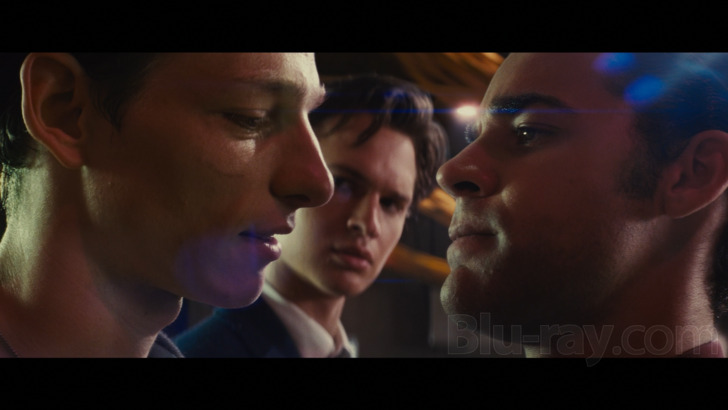
- The Stories of West Side Story (HD; 1:36:53) is an excellent multi-part featurette which attempts (and I'd say actually succeeds) to deal, at least in passing, with the interwoven legacies of the original stage musical and the 1961 film. There are a glut of insightful interviews with the principal cast and crew and the piece focuses on a number of key sequences, with some fun rehearsal footage included.
- The Songs includes:
- Prologue (HD; 7:12)
- La Borinquena (HD; 1:36)
- Jet Song (HD; 2:41)
- Something's Coming (HD; 2:46)
- The Dance at the Gym (HD; 2:16)
- Maria (HD; 3:07)
- Balcony Scene (Tonight) (HD; 6:23)
- America (HD; 5:13)
- Gee Officer Krupke (HD; 4:58)
- One Hand, One Heart (HD; 4:33)
- Cool (HD; 4:16)
- Tonight (Quintet) (HD; 3:31)
- The Rumble (HD; 4:17)
- I Feel Pretty (HD; 3:42)
- Somewhere (HD; 3:09)
- A Boy Like That / I Have A Love (HD; 5:07)
West Side Story Blu-ray Movie, Overall Score and Recommendation 
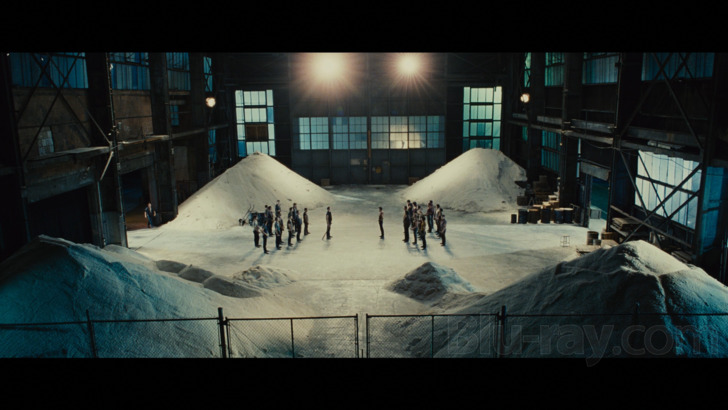
Early in my reviewing career here at Blu-ray.com, I was tasked with watching and writing about countless contemporary productions of iconic operas which I would charitably classify as being in the Eurotrash category. Viewing everything from Mozart to Richard Strauss in new if arguably unimproved versions which could feature everything from leather clad women bearing whips to women wearing nothing at all in sometimes sleazy, smarmy stagings just left me feeling kind of dirty after having watched them. The good news here is that Spielberg and his team have approached this venerable property with respect and maybe even reverence. The results here may not erase memories of the original film, but really, do they even have to? A lot about this West Side Story connects powerfully, and were there not a 1961 version to compare it to, I think it might be more easily considered to be a formidable achievement. Technical merits are solid and the main making of featurette very well done. Recommended.
Other editions
West Side Story: Other Editions

West Side Story 4K
2021

West Side Story 4K
2021

West Side Story 4K
Limited Edition Fabric Poster
2021

West Side Story 4K
Art Edition
2021

West Side Story
2021
Similar titles
Similar titles you might also like

Hamilton
2020

In the Heights 4K
2021

Going My Way
75th Anniversary Edition
1944

A Chorus Line
1985

Dreamgirls
2-Disc Showstopper Edition
2006

Fame
1980

New York, New York
1977

De-Lovely
Special Edition
2004

Carmen Jones
Fox Studio Classics
1954

Godspell
1973

Hair
1979

Million Dollar Mermaid
Warner Archive Collection
1952

How to Succeed in Business Without Really Trying
Limited Edition to 3000
1967

Jesus Christ Superstar
1973

Carousel
1956

Stormy Weather
Limited Edition to 3000 - SOLD OUT
1943

Spinout
Warner Archive Collection
1966

Clambake
1967

Billy Elliot: The Musical Live
2014

Oliver!
1968
